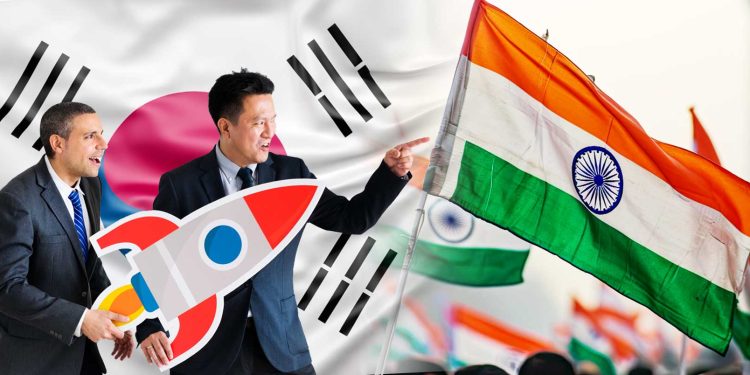India is becoming Asia’s next major innovation frontier. With a massive domestic market, supportive policies, and surging infrastructure investment, the country is turning into a critical destination for global startups. Korean innovators, from edtech to fintech and healthcare, are now moving fast to establish a foothold — aiming to align their technologies with India’s fast-evolving digital economy.
India’s Expanding Startup Landscape Attracts Korean Entrants
India is emerging as a new growth hub for startups, combining a vast consumer base of 1.6 billion people with strong government backing for digital transformation. Despite global economic slowdowns, India’s economy continues to outperform expectations, posting 7.4% GDP growth in the first quarter of 2025, according to official government data — one of the highest among major economies.
The Indian government’s flagship initiative, “Startup India,” has fueled the country’s rapid ascent in entrepreneurship rankings. The program provides regulatory easing, tax incentives, and funding support, accelerating new startup formation and cross-border interest. These policies have made India an increasingly attractive market for Korean founders looking to expand beyond Asia’s traditional innovation centers.
Industry observers note that localization remains key to success. Korean startups entering India are tailoring their business models to address local priorities — education access, financial inclusion, and healthcare gaps — while leveraging advanced AI and digital platforms.
Education and AI: Turing Aligns with India’s STEM Push
Among early success stories is Turing, a Korean edtech startup that has gained attention by supporting India’s STEM (Science, Technology, Engineering, Mathematics) education reforms. The company launched GPAI, an AI-powered learning platform designed specifically around Indian curricula and textbooks.
The solution integrates three core features — AI Solver, Cheat Sheet, and Note Taker — providing students with all-in-one tools for step-by-step reasoning and problem-solving. After deploying the platform to leading institutions such as the Indian Institutes of Technology (IITs), Turing verified its effectiveness and adopted an ambassador-based outreach model targeting influential university networks.
Following strong traction, the company expanded into a mobile app serving wider demographics, achieving record daily active users (DAU). Turing now plans to use its Indian base as a springboard for entry into the U.S., Korean, and Japanese markets, positioning India as its primary global testbed.
Fintech and Inclusion: Balance Hero’s “True Balance” Reaches 85 Million Users
In fintech, Balance Hero continues to scale in India with its prepaid mobile recharge and microfinance platform, True Balance. The app addresses financial exclusion by serving nearly one billion consumers who lack formal credit scores and access to traditional banking.
The company’s mobile-based, fully contactless system processes loan applications and fund transfers within seconds — a critical advantage in regions with limited financial infrastructure. True Balance has surpassed 85 million users and now operates across 97% of India’s territory, reinforcing Korea’s reputation for delivering scalable fintech solutions in emerging markets.
Healthcare and Impact: LabSD’s “CataScan” Brings AI Diagnostics to Rural India
In healthcare innovation, the social venture LabSD has launched CataScan, a smartphone-based cataract diagnostic app aimed at reducing preventable blindness in rural India. The app directly supports India’s national goal of lowering cataract-related blindness rates while improving accessibility in underserved areas.
By embedding on-device AI technology, CataScan functions effectively even on low-spec smartphones, allowing use in low-income communities. LabSD also offers free institutional accounts to local hospitals, enabling more efficient patient management and broadening access to essential medical services.
A Strategic Market for Korea’s Global Startup Expansion
India’s transformation into a global startup hub represents more than market opportunity — it signals a broader shift in Asia’s innovation geography. Analysts project that India’s digital economy could reach around USD 1 trillion by 2030, driven by fintech, healthtech, and AI.
India’s growing startup ecosystem complements the Ministry of SMEs and Startups (MSS)’s “Global Expansion” agenda, which helps Korean ventures scale abroad through initiatives like Launchpad UAE and the K-Startup Grand Challenge. As a result, India has become a vital partner in Korea’s strategy to broaden startup growth beyond established hubs such as the U.S. and Japan.
Industry experts also note that India’s demand for accessible innovation mirrors Korea’s strength in applied technology and digital efficiency. Therefore, Korean startups that adapt to local needs — combining technological sophistication with affordability — are likely to find sustainable growth in this emerging market.
Beyond Market Entry — Building Innovation Bridges
As India cements its role as a startup powerhouse, Korean innovators are seizing the chance to bridge ecosystems between Seoul and New Delhi. The collaboration reflects the convergence of two economies driven by youth, technology, and entrepreneurship.
Policymakers and founders alike will eventually view India as a strategic frontier where scalable innovation will shape the next decade of Asia’s growth. Still, success depends on how effectively startups localize solutions, navigate policy frameworks, and generate real impact in one of the world’s most dynamic markets.
🤝 Looking to connect with verified Korean companies building globally?
Explore curated company profiles and request direct introductions through beSUCCESS Connect.
– Stay Ahead in Korea’s Startup Scene –
Get real-time insights, funding updates, and policy shifts shaping Korea’s innovation ecosystem.
➡️ Follow KoreaTechDesk on LinkedIn, X (Twitter), Threads, Bluesky, Telegram, Facebook, and WhatsApp Channel.






